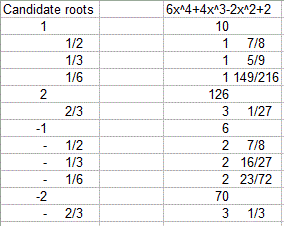How do you use the rational roots theorem to find all possible zeros of #f(x) = 6x^4 + 4x^3 - 2x^2 + 2#?
1 Answer
Mar 31, 2016
There are no Real zeros for the given equation.
Explanation:
If we attempt to use the Rational Root Theorem by testing
in
the candidate values would be:
but as indicated in the table below, none of these give a zero result:

Therefore there are no rational zeros for this expression.
In fact, if we consider the graph for this expression, we can see that it has no Real zeros.
graph{6x^4+4x^3-2x+2 [-8.036, 9.754, -0.84, 8.05]}
